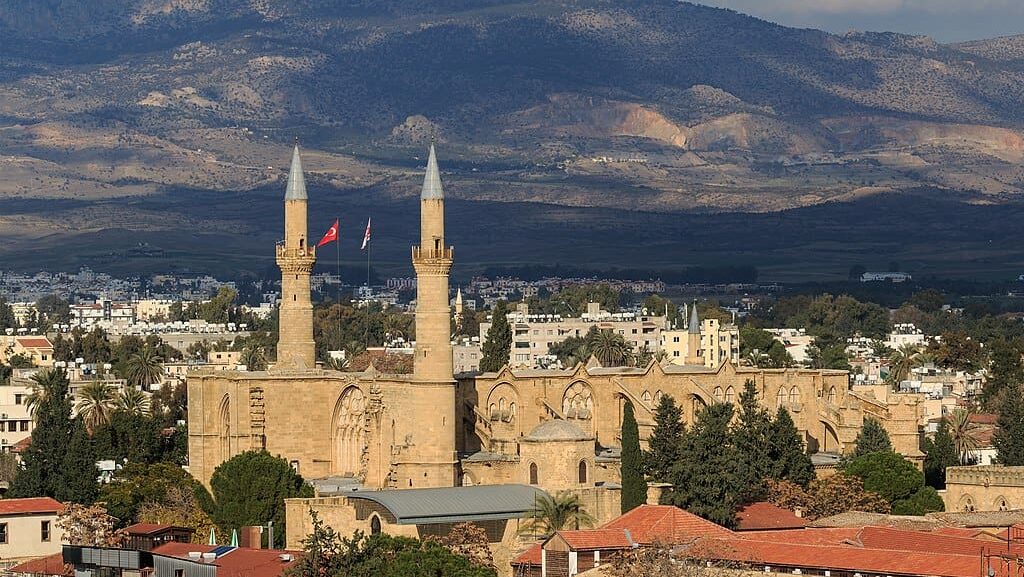
Selimiye Mosque (former St. Sophia Cathedral) from Shacolas Tower (Ledra Street Observatory) in Nicosia, Cyprus
Photo: A.Savin, FAL, via Wikimedia Commons
Fifty years after Turkey’s invasion and occupation of 36% of Cyprus, the systematic Islamization of the island’s northern part has become increasingly evident. This transformation is not incidental but a calculated initiative by Ankara, aligning with its broader neo-Ottoman ambitions. The steady shift toward political Islam in northern Cyprus carries profound implications for regional stability, European security, and the preservation of cultural heritage.
The 1974 Turkish invasion of Cyprus, widely condemned as unlawful by the international community, forcibly displaced nearly 200,000 Greek Cypriots and led to the systematic erasure of Greek cultural heritage in the north. Greek street names, monuments, and place names were replaced with Turkish equivalents. Over 520 Greek Orthodox churches and cemeteries were desecrated or looted, and more than 23,000 Byzantine icons were either destroyed or stolen—an act UNESCO has described as an “institutionalized erasure” of Christian heritage.
Simultaneously, Turkey has facilitated illegal settlements from mainland Anatolia, significantly altering the region’s demographics. This population transfer, in violation of Article 49 of the Geneva Convention, has transformed northern Cyprus from a predominantly secular society into one increasingly influenced by Islamist ideology.
The rise of the AKP (Justice and Development Party) marked a new phase in Turkey’s Islamization of northern Cyprus, evident across key areas. Turkish-funded religious schools and Islamic education programs have expanded, often in direct opposition to the historically secular Turkish Cypriot identity. Local teachers’ unions have persistently opposed these initiatives, denouncing them as tools of ideological indoctrination.
Ottoman-style mosques have rapidly proliferated across northern Cyprus. By 2022, reports indicated that 213 mosques had been built, with the largest—featuring 62 domes and six minarets—completed in early 2024. This dramatic transformation of the region’s architectural landscape underscores a deliberate effort to reshape its cultural identity. Additionally, Turkey’s Directorate of Religious Affairs (Diyanet) has deepened its influence in the occupied territories, aligning religious affairs with Ankara’s strategic objectives.
One of the most prominent projects reflecting this agenda is the Turkey-funded Külliye complex in Nicosia’s occupied Ayios Dhometios neighborhood. With an estimated cost of 2.5 billion Turkish lira ($71 million), the complex includes a “presidential palace,” parliament, mosque, park, and courthouse. Spanning over two million square feet for government buildings and five million square feet for the mosque and its surrounding garden, the project is designed in an Ottoman architectural style to symbolize Turkish sovereignty and cultural dominance in northern Cyprus. The Külliye complex and the “Nation’s Mosque” are key components of a broader infrastructure initiative aimed at reinforcing Turkey’s influence in the occupied territories. Unlike traditional Külliyes, which historically functioned as community hubs focused on social welfare and spiritual enrichment, this project has drawn criticism from Turkish Cypriots who see it as a political and symbolic extension of Ankara’s agenda rather than a response to local religious needs.
Turkey’s Islamization of northern Cyprus must be understood within the broader context of its regional ambitions. The Erdogan administration has consistently employed Islam as a soft power instrument, mobilizing Muslim communities abroad to extend Turkish influence. Across Europe, Ankara has supported political movements such as Sweden’s Nyans Party, which seeks to unify Muslim communities under a political Islam framework. Turkey’s efforts to reshape European discourse on Islam and integration pose a direct challenge to European cohesion.
Beyond Europe, Turkey has expanded its reach through religious networks and cultural diplomacy in the Balkans and North Africa, fostering political and economic dependencies in historically Ottoman territories. At the United Nations, Erdogan has lobbied for a permanent seat for a Muslim-majority nation on the Security Council, reinforcing Ankara’s broader goal of consolidating a global political Islam movement.
Turkey’s actions in northern Cyprus are not merely a localized issue but a European security concern. The Islamization of the occupied territories presents multiple risks. The destruction of Christian sites in northern Cyprus sets a dangerous precedent for heritage preservation within EU territories. Additionally, the deepening influence of political Islam in northern Cyprus aligns with broader Turkish efforts to project Islamist ideology across Europe and the Mediterranean. Turkey’s strategic use of migration and religious influence undermines European integration efforts, particularly regarding secular governance models.
To counteract these threats, European policymakers must adopt a multi-faceted approach. The EU should increase funding for the documentation and protection of Cypriot Christian heritage, ensuring accountability for cultural erasure. Intelligence-sharing mechanisms must be strengthened to track Ankara’s religious-political networks within European communities. Finally, Brussels must take a firmer stance on Turkey’s violations of international law, reinforcing support for Cypriot sovereignty.
The Islamization of occupied Cyprus is not an isolated development but part of Turkey’s broader neo-Ottoman ambitions. It poses a direct challenge to European stability, cultural preservation, and geopolitical balance. European conservatives must recognize this evolving threat and advocate for decisive action to uphold European identity, sovereignty, and security.
